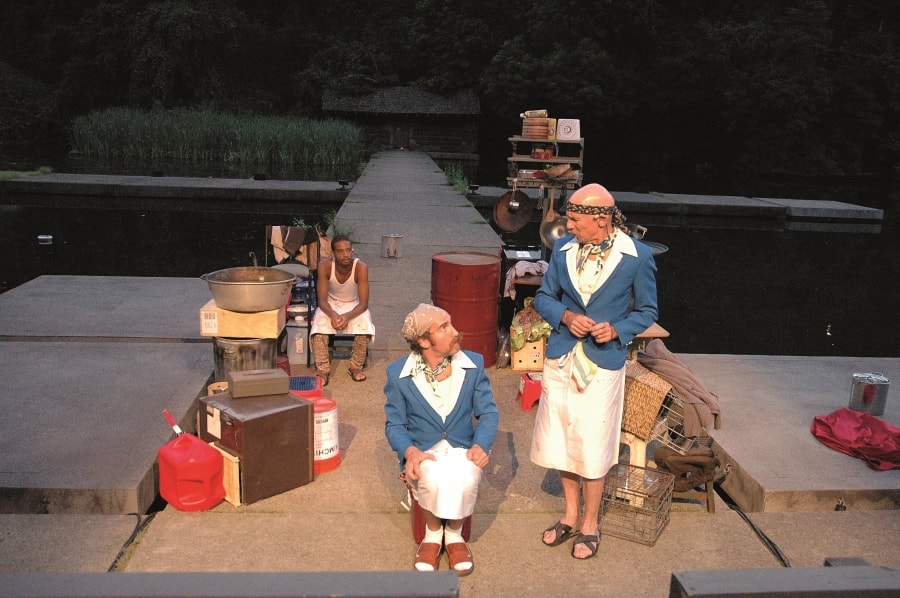Don’t show up to Roland Schimmelpfennig’s The Golden Dragon on an empty stomach. The prolific, award-winning German playwright, celebrated in Europe and now gaining traction in the U.S., sets his drama in a “Thai/Chinese/Vietnamese fast-food restaurant” that serves as a frequent culinary pit stop to dwellers in a Berlin apartment complex and the surrounding neighborhood. Characters order mouth-watering dishes throughout the play, like “Number 31: Gai Grob Prio Wan, crispy chicken breast with morels, pineapple and peach in sweet and sour sauce,” and “Number 6: Thai soup with chicken, coconut milk, Thai ginger, tomatoes, button mushrooms, lemon grass and lemon leaves (hot).” (One wonders if, in addition to set, costume and lighting designers, there’s also a smell designer.)
In The Golden Dragon, produced by New York City’s Play Company at the New Ohio Theatre May 8–June 9, five actors take on 15 roles. Age, ethnic background and gender become moot as actors morph from one role to the next in short nonlinear scenes: a young Chinese kitchen-hand suffers from an excruciating toothache. Without insurance or working papers, he receives an impromptu extraction in the kitchen. The tooth flies into the soup of a customer. Meanwhile, two stewardesses converse on the ground while interludes about an elegant grasshopper that is violated and abused by a cricket pepper the goings-on.
Schimmelpfennig’s play was not inspired by a trip to the dentist or the exterminator but by “a group of young, mostly illegal aliens and a lawyer who took up their cases in Germany and Europe,” says the playwright, who wanted to write a play about immigration issues while avoiding documentary-theatre tendencies. Instead he set out to “seduce people to listen and to the watch the most beautiful and the oldest of theatrical ideas: to ‘play,’ to tell a relevant story.”
The Golden Dragon has a porous feel, moving swiftly from scene to scene, with stage directions spoken out loud by the actors. The tone shifts from comedic to tragic in an instant. In a review for The Guardian, Lyn Gardner likened the play to a bowl of deceptively spicy soup—though “it only offers a real punch in the final few mouthfuls, its intelligence and thoughtfulness is apparent.”
“My plays don’t care about intellectuals in galleries, but about fruit dealers and cashiers, the bleary-eyed girls in the morning on the subway,” Schimmelpfennig declares boldly. “Berlin isn’t an intellectual city any more. It’s an open city, an international metropolis. That’s the city I write for.”
Asked how it plays differently in the U.S.—the show has previously received productions at Pittsburgh’s Quantum Theatre and D.C.’s Studio Theatre—Schimmelpfennig says, “The U.S. immigration situation is, of course, different from the German or European ones. People from all cultures have been searching for a new life in the U.S. for centuries, but Europe is called ‘Fortress Europe’—Festung Europa.”


